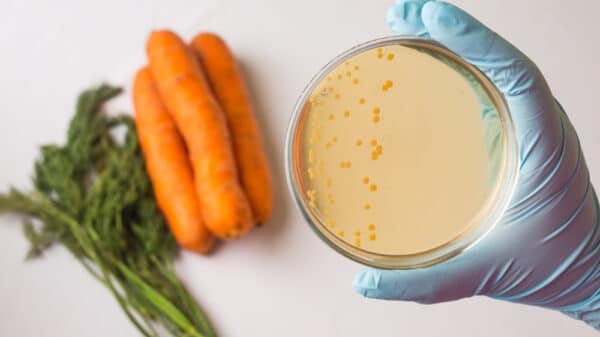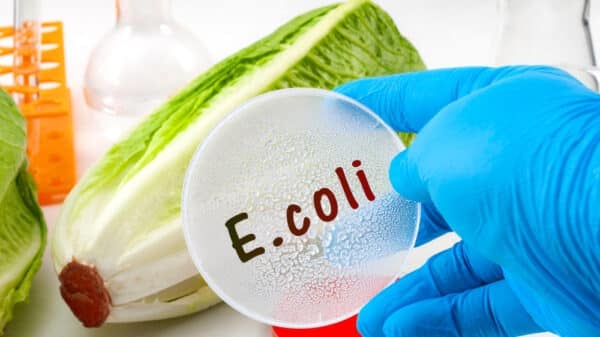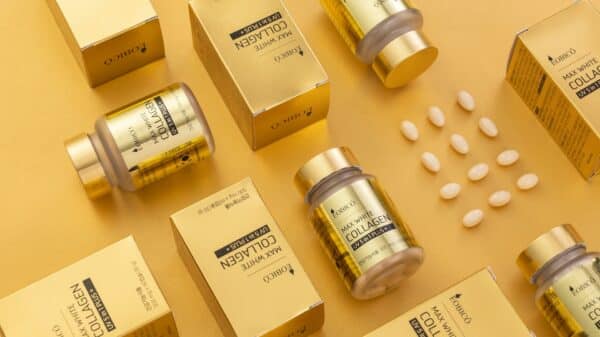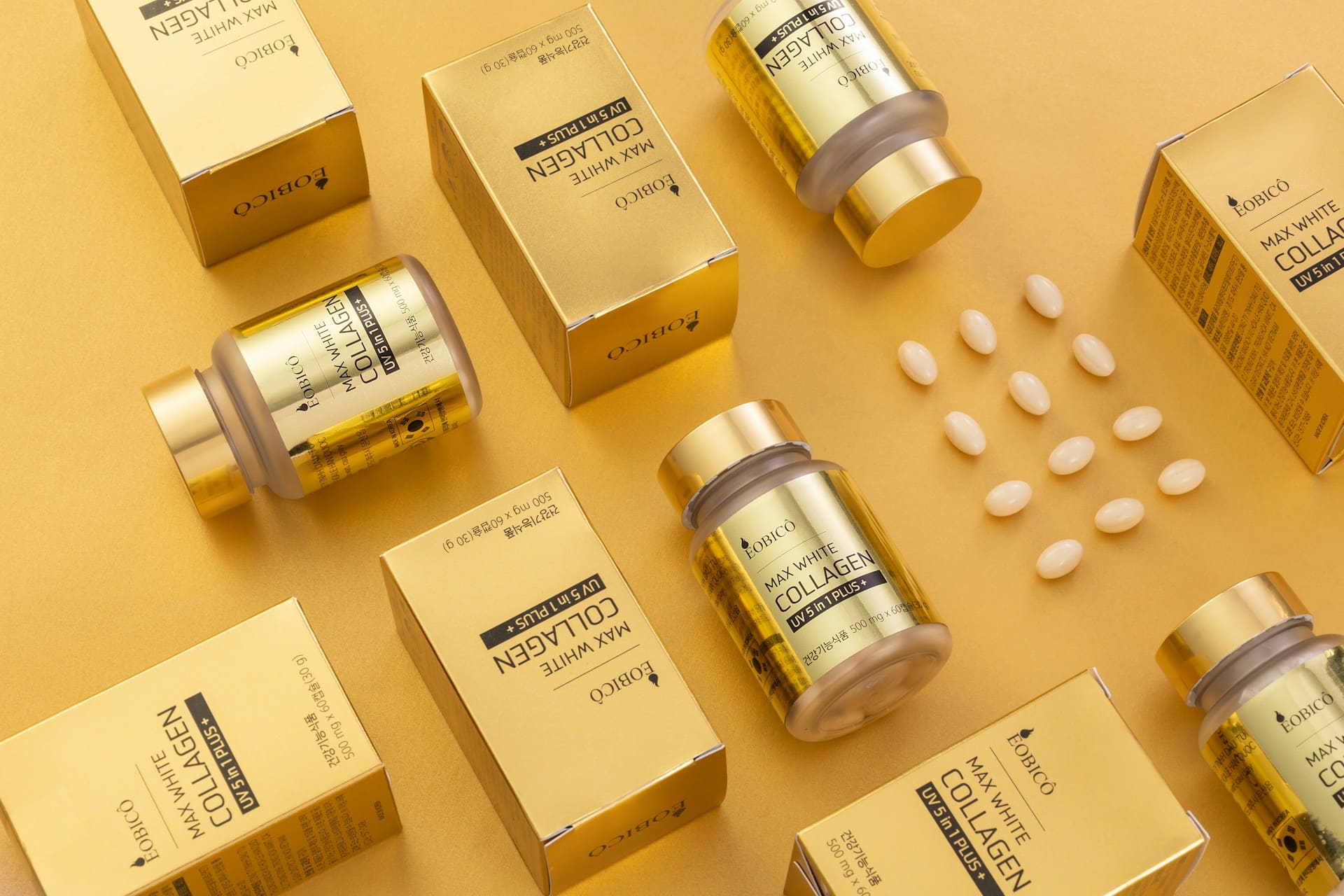You might have seen collagen mentioned on the labels of your favorite skincare products or spotted it in supplements that promise to support joint health. But have you ever stopped to wonder: what exactly is collagen, what does it do for your body, and how can you incorporate it into your daily routine?
Collagen is the most abundant protein in your body, with Type 1 collagen being the star player. It’s a crucial building block found in your muscles, bones, skin, blood vessels, digestive system, and tendons. Think of collagen as the supportive framework that holds everything together—it’s what gives your skin its strength and elasticity, while also playing an essential role in the health of your joints and tendons. In simplified terms, it’s the “glue” that keeps your body intact and functioning.
As we age, our natural collagen production starts to decline, which can lead to some not-so-fun signs of aging. Wrinkles? Sagging skin? Achy joints? Yep, that’s your body’s way of saying it needs a little extra collagen support. Thankfully, there are various food sources and supplements that can help you maintain your collagen levels as you age.
What is Collagen?
Collagen is often referred to as a “complex protein,” and it’s not hard to see why—it’s made up of an astounding 19 different amino acids. Among these, you’ll find a mix of essential (the ones your body can’t produce on its own and needs from food) and non-essential (your body can produce them) amino acids. Some of the key heavyweights in collagen include arginine, glutamine, glycine, and proline.
What truly makes collagen unique is its structure. Composed of three strands twisted together in a tight triple helix, each strand is made up of more than 1,400 amino acids. These collagen fibers take on the shape of the connective tissues they form, and this “microfibrillar structure” is what defines and maintains their form.
What Causes Collagen Loss?
As we get older, our bodies naturally slow down collagen production, which contributes to the visible signs of aging. Think about it: those little wrinkles and sagging areas on your skin, coupled with the stiffness in your joints? That’s the unfortunate result of your body losing its ability to produce enough collagen.
Lifestyle factors also affect collagen levels. Diets high in sugar, smoking, excessive alcohol intake, and even too much sun exposure can contribute to decreased collagen. On top of this, certain collagen-related health issues can arise from a combination of genetic factors, inadequate intake of collagen-rich foods, nutritional deficiencies, and digestive challenges that impair collagen synthesis.
Nutrition Facts
The building blocks of collagen are primarily two amino acids: proline and glycine. Interestingly, both of these aren’t often found in abundance in many meat sources that typical Western diets rely on for protein.
When you’re feeling under the weather, or if life has you stressed out, your body might struggle to produce enough of these amino acids. This is where outside help—from your diet or supplements—becomes crucial.
Here’s a closer look at some of the amino acids that make collagen so effective, along with a few of their significant benefits:
– Proline: Making up roughly 10 to 15 percent of collagen, proline is essential for maintaining blood vessel integrity and supporting joint health, in addition to offering cardiovascular benefits. It helps ensure that everything runs smoothly in your body.
– Glycine: Despite being the smallest amino acid, glycine represents about a third of the protein found in collagen and plays some critical roles. It assists in building DNA strands and is key for forming creatine, which is vital for muscle growth and energy production during your workouts.
– Glutamine: Often considered one of the most important nutrients for our bodies, glutamine can be synthesized in our muscles or sourced from food. Research has shown that glutamine helps with various issues, such as anxiety, sleep disturbances, and poor concentration. It even boosts the production of growth hormone, contributing to better mental health and overall well-being.
As you navigate through life and all its ups and downs, think about how you can support your body’s collagen production. Simple changes in your diet or adding a high-quality collagen supplement can make a big difference in maintaining your health and vitality. After all, life is too short to feel less than your best, and a little extra collagen can go a long way in helping you look and feel your absolute best.
Collagen, a fundamental protein found throughout our bodies, plays a vital role in maintaining the integrity of our skin, joints, and connective tissues. When we think about protein, we often associate it with muscle building and recovery, but collagen holds its own unique place in our health, and understanding its benefits can transform how we approach our wellness routines.
- Arginine: Arginine (or L-arginine, as it’s also known) is an amino acid that converts into nitric oxide in the body, a compound essential for promoting healthy circulation and cardiovascular health. Research indicates that arginine can enhance blood flow, bolster the immune system, and even uplift male libido. This means that its benefits extend beyond just physical health, playing a role in overall well-being and vitality.
- Threonine: Often flying under the radar, threonine is an amino acid that serves significant functions in the body. It’s crucial for forming connective tissues like collagen and elastin, which play an important part in maintaining skin elasticity and overall structural integrity.
Benefits
You might be wondering, what does collagen really do for your body? Let’s dive into some of its most noteworthy benefits:
1. Improves the health of skin
Why is collagen touted as a must-have for skin health? It’s because increasing collagen levels can make a remarkable difference in how your skin looks and feels, providing firmness and smoothness while supporting natural in-house repair and renewal processes. A randomized, triple-blind, placebo-controlled study revealed that collagen can effectively counteract signs of aging—think fine lines, loose skin, and diminished elasticity.
Further investigations, including double-blind, placebo-controlled trials, have shown that a daily intake of collagen hydrolysate (ranging from 2.5 to 5 grams) over eight weeks can lead to significant improvements in skin elasticity and moisture and a reduction in roughness, all while maintaining a low risk of side effects. Essentially, this makes collagen a star ingredient in natural skin care.
If you’re concerned about cellulite and stretch marks, collagen may help there too. As we age and collagen levels decline, skin can become thinner and less resilient, causing those pesky lumps and marks to become more visible. By restoring collagen, you might just find that your skin regains some of its youthful bounce.
2. Reduces joint pain and degeneration
Do your knees or elbows sometimes feel stiff or painful? That could be a telltale sign of declining collagen, which is essential for healthy and flexible joints. As this protein diminishes, our connective tissues, including tendons and ligaments, may not perform as smoothly, leading to discomfort and swelling.
Think of collagen like the oil in your car—it keeps everything running smoothly. By increasing collagen intake, you’re essentially greasing those creaky joints, making movement more pain-free. Research has shown that collagen can significantly relieve symptoms associated with joint pain and even becomes a go-to treatment for osteoarthritis.
In fact, a 2019 study highlighted collagen’s efficacy in managing osteoarthritis symptoms, showcasing its potential to improve joint health and quality of life. If you’re struggling with everyday activities due to joint issues, collagen could be your ally.
3. Helps remedy leaky gut
If you’ve ever experienced digestive challenges, you may find solace in collagen’s benefits. It plays a crucial role in repairing the gut lining, helping to restore the protective barrier that keeps harmful toxins at bay. By breaking down proteins and soothing the lining of the gastrointestinal tract, collagen becomes a protective friend against conditions like leaky gut syndrome, IBS, and even more severe digestive diseases like Crohn’s disease.
In studies involving inflammatory bowel disease, lower collagen levels were observed in patients, suggesting a link between collagen deficiency and digestive disorders. Adding collagen peptides to your routine could assist in alleviating gastrointestinal discomfort and inflammation while promoting better nutrient absorption.
4. Boosts metabolism, muscle mass, and energy output
Many of us aspire for a metabolism boost, and collagen can help here too. It supports the increase of lean muscle mass, which is super important, especially as we age; retaining muscle helps maintain good posture, strengthens bones, and burns calories efficiently. One key amino acid found in collagen, glycine, not only helps form muscle tissue but also plays a significant role in converting glucose into energy that our muscles thrive on.
Pairing collagen with vitamin C can further optimize its effects, ensuring that your body transforms collagen into usable protein effectively. This combination can reignite your energy levels and vitality, making it a win-win for both body and spirit.
The intricate workings of our bodies are nothing short of miraculous, especially when it comes to how we maintain our health and vitality. Among the many players in this grand symphony are glycine and arginine, two amino acids that contribute significantly to both our digestive and central nervous systems. They’re not just technical terms; they embody the essence of our body’s resilience, helping us feel youthful and vibrant.
Glycine, for instance, is like a secret weapon against aging. Research indicates that it enhances our body’s ability to utilize antioxidants more effectively, which plays a key role in fighting off the cellular damage that comes from everyday stressors. But glycine doesn’t stop there; it actively participates in the creation of healthy cells from DNA and RNA, serving as a building block for regeneration. Imagine being able to bolster your body’s defenses while simultaneously working to keep your cells in peak condition—this is the promise that glycine brings.
On the other hand, arginine is a powerhouse when it comes to protein synthesis. This process is critical for repairing muscle tissue, promoting proper growth and development, and boosting metabolism. The benefits of ensuring your body has enough arginine extend beyond just muscle repair; it hurts when injuries linger, and arginine helps move the healing process along, making a tangible difference in the lives of those who incorporate it into their diet.
When it comes to beauty and overall health, one cannot overlook the powerful role collagen plays. If you’ve found yourself dealing with peeling or splitting nails, weak hair, or dental issues, collagen might just be a missing piece in your health puzzle. Collagen protein forms the very foundation of our hair, nails, and teeth. By incorporating collagen-rich foods or supplements into your routine, you may be able to not only fortify your nails but also turn back the clock on hair loss.
According to a fascinating study published in the *Journal of Investigative Dermatology*, the link between the extracellular matrix and hair follicle regeneration suggests that enhancing collagen intake could be a game-changer in the fight against hair loss. Picture this: just three months of increased collagen intake could improve hair volume, scalp coverage, and thickness. And by six months? Expect softer skin and deeper hydration, helping you look and feel rejuvenated.
But the benefits of collagen stretch far beyond aesthetics. If detoxification and liver health are on your radar, collagen is a strong ally. Glycine found in collagen can mitigate the damage your liver endures as it filters out harmful substances, alcohol, and toxins. If you’re keen on cleansing your liver, consider trying a bone broth fast. This gentle approach can help repair your gut and boost your immune system, setting you up for overall wellness.
Collagen also plays a protective role for your cardiovascular health. The amino acid proline helps keep our arteries clear by aiding in the removal of fat buildup in the bloodstream. This isn’t just a vain concern—arterial health directly impacts blood pressure and cardiovascular function, acting as a buffer against stressors. Imagine knowing you have a natural means of minimizing these risks with something as simple as the right collagen-enhancing foods.
If you’re wondering how to integrate more collagen-rich foods into your diet, look no further than protein sources. Bovine collagen, sourced from cows, provides types 1 and 3 collagen, vital for muscle growth and recovery. On the other hand, chicken collagen is prized for its type 2 collagen, excellent for joint health. It comes packed with chondroitin and glucosamine, both known for their anti-aging properties.
Fish collagen, easily absorbed by the body, offers primarily type 1 collagen, which is essential for skin health, digestion, and organ function. For even better results, pair your collagen intake with vitamin C, which is crucial for collagen stability. Finally, don’t overlook eggs: eggshell membrane collagen is another excellent source, primarily composed of type 1 collagen, further contributing to skin and joint health.
As you contemplate the role of these powerful amino acids and collagen in your life, remember: nurturing your body and supporting its natural processes can lead to both remarkable health outcomes and improved quality of life. Whether you’re seeking to enhance your beauty routine or simply want to ensure your body is performing at its best, making informed dietary choices holds the key. Emphasizing collagen and a balanced intake of glycine and arginine could very well be your ticket to experiencing a healthier, more youthful you.the cooked form of collagen and is commonly used in culinary applications. It’s derived from collagen, but the cooking process breaks it down into smaller, more digestible proteins, making it a bit different from its raw counterpart.
When you eat gelatin, you’re still benefiting from many of the same amino acids found in collagen, like glycine and proline. However, it’s essential to note that gelatin doesn’t provide the same degree of bioavailability as hydrolyzed collagen peptides. This means that while it still supports joint health, skin elasticity, and gut health, its absorption might not be as efficient.
Understanding the distinction between collagen and gelatin can help you better choose the right supplement or dietary addition for your specific health needs. If you’re dealing with specific issues like joint pain, skin elasticity concerns, or even gut health, hydrolyzed collagen peptides might be more effective due to their easier absorption.
In contrast, if you’re looking to incorporate some collagen into your diet through delicious recipes, gelatin can be a fantastic way to do that. Think of it as a culinary way to boost your collagen intake while treating yourself to some delightful dishes such as homemade gummies, jellies, or creamy desserts.
Ultimately, both collagen and gelatin have their unique benefits. The key takeaway here is to listen to your body and pay attention to how it responds to different sources of these proteins. If you notice improvements in your skin, joints, or overall health, it’s a clear indication that you’re on the right track.
Image Source: Unsplash
































